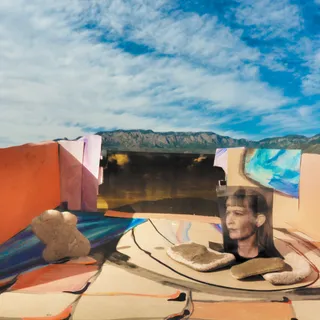ALBUM REVIEW: Jenny Hval, Classic Objects
- Ryan ANTIART

- Mar 15, 2022
- 4 min read
Grade: C+

Jenny Hval has been making music for over a decade at this point, but it wasn’t until last year’s Lost Girls that I really started to key in to what she was doing. Producer Håvard Volden collaborated with her on that, giving the project a real vast sense of space. Music like hers feels as if it is made for critics to endlessly fawn over and dissect. The jagged structures and esoteric phrasing of a song like “Love, Lovers” particularly stuck out to me in this way. It starts off with some spare drums and twinkling keys, eventually giving into hypnotic grooves and vocalizations from Hval herself, wrapping up just beyond the 15 minute mark. I praised this project for how icy and self-referential it was, but there is no scenario I would’ve given it a shot if I wasn’t a music critic. Her music splits my music listening personality into two: the fan and the writer. For me, listening to Lost Girls was a writing job. Her newest offering, Classic Objects however, slowly begins to fuse my roles.
For starters, there are no 15 minute tracks. The music here is much more inviting and casual, filled with tropes from adult contemporary, artpop and even ‘70s funk. Lost Girls felt like looking at a modern art exhibit, Classic Objects is far more journalistic and plainly written, relatively speaking. “American Coffee” starts with an anecdote about her mother driving to work everyday before her birth, crying in her car every single day in the parking lot. There are concrete details, like towns she’s lived in (“I left for Northbridge, Fitzroy, Astoria…”) mixed with more existential ideas (“A concept is a brick/It can be used to build a courthouse of reason/Or it can be thrown through a window”). It’s basically sung spoken word, heady poetry hidden behind inviting bongos and vintage organs. The music is so sweet that it took me three listens for me to hear the part about her watching La Passion de Jeanne d’Arc with a UTI. The way she describes the actress on screen feeling her pain, and the color of the blood in the lobby bathroom is so novelesque, yet I wouldn’t mind cruising around in my car to this.
This is all to say, she is able continue her batshit philosophical ponderings while still appealing to a wider audience. While musically the record is not quite as compelling and stark, the more inviting nature of it certainly makes for a smoother listen overall. The opening track “Year of Love” incorporates these chunky bass guitars and chimes that reminds me of “Eminence Front” by The Who. This one delves into the patriarchal idea of marriage, with Jenny relating it to a stage play where she is a mere stagehand. It’s almost like a big theatrical production that, as a woman, she is merely working on. Even when she is on stage as an actress later in the song, she is still being guided around, seemingly confused about what she is exactly doing there. It’s a really great intro that connects to the more impressionistic titled track later on. Here, her life is not just a stage play but a model of one. She is moving around these places, people and things in the model, arranging them ornately. She admits regarding the objects she arranges, “I’m not sure if these are art or just stuff she made for me.” It's hard to tell what exactly Hval is making for us as well, and that’s the point.
The songs I don’t like get a little overlong and avant-garde, like “Cemetery of Splendour” and “Jupiter”. In short bursts, her odd singing style does the trick, but in long form, it gets a little bit tiring to be honest. Even so, lyrical gems like “I could open my mouth and pour out mirages” slip out and make up for the verboseness just a bit. “Year of Sky”, just like “Year of Love”, offers a complete thought that is explored and concluded by the end of the song. Time is relative, used only as a reference point. Bugs should be followed more, because they find the cracks in our reality, via thin lines in the walls. In suspended time and with this lesson from the bugs, we can find cracks in the sky to enter heaven, at least I think that’s what she means. It all concludes with “The Revolution Will Not Be Owned”, which features my favorite line on the album, “A dream is a remix of awake.” It tackles themes of art and whether or not it should be commodified. In her utopia, people just freely make art from their heads and hearts, rather than from their stomachs (aka I need to sell this painting so I can eat). She even acknowledges that the song itself is dictated by “copyright regulations”, going back to her old Lost Girl self-acknowledging ways.
As I said at the start, this record was really interesting in that it was fused by personal tastes and critical abilities. I was able to enjoy more of the actual music here while still finding plenty to dive into lyrically. Even so, I do not love this album. I understand the thesis and intent, but I don’t find that it was executed perfectly. The singing in particular felt really awkward at some points without consideration for rhyming, and some of the longer songs could’ve definitely been cut. So, I would recommend this album but it’s not one of the best of 2022.






Comments